All Categories
Featured
Table of Contents
Do they contrast the IUL to something like the Vanguard Total Amount Supply Market Fund Admiral Shares with no tons, an expense ratio (ER) of 5 basis points, a turn over proportion of 4.3%, and an extraordinary tax-efficient record of circulations? No, they compare it to some awful proactively taken care of fund with an 8% tons, a 2% EMERGENCY ROOM, an 80% turnover ratio, and a horrible record of temporary capital gain distributions.
Shared funds typically make yearly taxed circulations to fund proprietors, also when the worth of their fund has gone down in value. Shared funds not just require revenue coverage (and the resulting yearly tax) when the shared fund is going up in worth, but can additionally impose revenue taxes in a year when the fund has actually decreased in worth.
You can tax-manage the fund, collecting losses and gains in order to minimize taxable circulations to the investors, but that isn't in some way going to transform the reported return of the fund. The ownership of mutual funds may require the shared fund proprietor to pay approximated taxes (universal life no lapse guarantee).

IULs are simple to position to make sure that, at the proprietor's death, the beneficiary is not subject to either earnings or inheritance tax. The very same tax obligation decrease methods do not work virtually as well with common funds. There are countless, frequently pricey, tax obligation catches related to the moment buying and selling of shared fund shares, traps that do not put on indexed life insurance policy.
Opportunities aren't really high that you're going to go through the AMT as a result of your mutual fund distributions if you aren't without them. The rest of this one is half-truths at ideal. While it is true that there is no income tax obligation due to your heirs when they inherit the profits of your IUL plan, it is also real that there is no income tax due to your beneficiaries when they acquire a shared fund in a taxable account from you.
Best Indexed Universal Life Insurance
The government inheritance tax exception restriction is over $10 Million for a pair, and growing yearly with inflation. It's a non-issue for the substantial bulk of physicians, much less the rest of America. There are better ways to prevent estate tax concerns than purchasing investments with low returns. Shared funds might trigger earnings tax of Social Safety and security benefits.

The growth within the IUL is tax-deferred and may be taken as free of tax income through lendings. The policy proprietor (vs. the common fund supervisor) is in control of his/her reportable earnings, thus enabling them to decrease and even eliminate the tax of their Social Safety benefits. This one is excellent.
Below's one more minimal problem. It holds true if you buy a common fund for state $10 per share right before the circulation date, and it distributes a $0.50 circulation, you are then going to owe taxes (probably 7-10 cents per share) regardless of the reality that you haven't yet had any type of gains.
In the end, it's really about the after-tax return, not how much you pay in taxes. You're also most likely going to have more cash after paying those tax obligations. The record-keeping needs for possessing shared funds are dramatically more intricate.
With an IUL, one's documents are kept by the insurance coverage firm, duplicates of yearly declarations are mailed to the owner, and distributions (if any) are amounted to and reported at year end. This set is likewise type of silly. Naturally you need to keep your tax documents in instance of an audit.
Back End Load Universal Life
Hardly a factor to get life insurance coverage. Shared funds are commonly component of a decedent's probated estate.
In enhancement, they undergo the hold-ups and expenses of probate. The profits of the IUL plan, on the various other hand, is always a non-probate circulation that passes beyond probate straight to one's called beneficiaries, and is for that reason not subject to one's posthumous financial institutions, unwanted public disclosure, or comparable hold-ups and costs.
Medicaid incompetency and lifetime income. An IUL can give their proprietors with a stream of revenue for their whole lifetime, regardless of just how long they live.

This is advantageous when arranging one's affairs, and converting assets to revenue before an assisted living home confinement. Mutual funds can not be converted in a comparable manner, and are generally thought about countable Medicaid possessions. This is an additional foolish one supporting that bad individuals (you know, the ones that need Medicaid, a federal government program for the inadequate, to spend for their retirement home) must use IUL rather than shared funds.
Universal Life Policy Vs Term
And life insurance coverage looks awful when contrasted fairly against a pension. Second, individuals that have cash to acquire IUL above and beyond their pension are going to need to be awful at managing cash in order to ever before get approved for Medicaid to pay for their assisted living home expenses.
Persistent and terminal health problem cyclist. All plans will permit a proprietor's simple accessibility to cash money from their policy, often forgoing any type of abandonment charges when such individuals suffer a severe health problem, need at-home treatment, or end up being constrained to a nursing home. Common funds do not supply a comparable waiver when contingent deferred sales charges still put on a shared fund account whose owner requires to sell some shares to money the expenses of such a remain.
Universal Life Insurance Retirement
You get to pay even more for that benefit (rider) with an insurance coverage policy. Indexed global life insurance coverage offers fatality benefits to the recipients of the IUL owners, and neither the proprietor neither the beneficiary can ever shed money due to a down market.
I definitely don't need one after I get to financial independence. Do I desire one? On average, a purchaser of life insurance pays for the real expense of the life insurance advantage, plus the prices of the policy, plus the profits of the insurance policy firm.
Ul Mutual Company
I'm not entirely sure why Mr. Morais included the entire "you can not shed money" again below as it was covered quite well in # 1. He simply wanted to duplicate the ideal marketing factor for these points I expect. Again, you don't lose small dollars, however you can shed real dollars, in addition to face major chance cost due to reduced returns.

An indexed global life insurance policy policy proprietor might exchange their plan for an entirely different plan without causing income taxes. A shared fund proprietor can not relocate funds from one mutual fund company to an additional without marketing his shares at the former (therefore activating a taxable occasion), and redeeming brand-new shares at the last, often subject to sales fees at both.
While it holds true that you can exchange one insurance coverage for an additional, the factor that people do this is that the very first one is such a dreadful plan that also after getting a brand-new one and experiencing the very early, unfavorable return years, you'll still appear ahead. If they were marketed the appropriate policy the very first time, they should not have any type of need to ever before trade it and experience the very early, unfavorable return years again.
Latest Posts
Iul Insurance Pros And Cons
Life Insurance Term Vs Universal
Life Insurance Stock Index